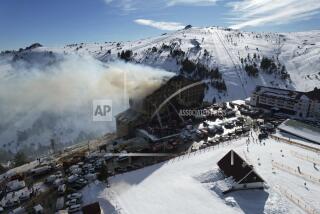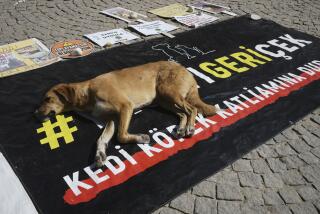With Quake Death Toll Rising, Officials Decry Media Attacks
- Share via
ISTANBUL, Turkey — As hundreds of new corpses emerged from the rubble of Turkey’s earthquake, official censors Tuesday ordered a private television station off the air for a week for what they called “provocative” criticism of government rescue and relief efforts.
The ban against Channel 6, a nationwide station, was the first coercive measure in the government’s effort to quiet the public outcry over its faltering response to the Aug. 17 disaster.
With the search for survivors all but abandoned, bulldozers tore into mounds of collapsed apartment buildings across Turkey’s industrial heartland, exposing more of the dead. The confirmed death toll soared to 17,997 on Tuesday and U.N. officials said the final toll could be more than double that number. But the Turkish government early today dropped the number of deaths by more than 5,000, to 12,514. A government official blamed an error in entering data from Izmit into a computer.
Turkish and foreign relief teams, joined by Turkish army troops, worked in a thunderstorm to distribute food and set up tents for the estimated 200,000 people made homeless in Istanbul and a string of settlements extending 175 miles to the east.
Prime Minister Bulent Ecevit pledged Tuesday that the tent cities would be finished within a week and replaced before winter by prefabricated housing. He acknowledged that “mistakes were made” in allowing contractors to build structurally unsound buildings that collapsed in the magnitude 7.4 quake, and promised tighter enforcement of building codes.
The government has managed in recent days to mount a full-scale relief effort, after a slow start that stunned and angered Turks. It has fought back with pressure on the Turkish news media, whose hard-edged quake coverage has reflected popular dismay over the government’s absence from much of the stricken zone for the first two days after the disaster.
“Some of the Turkish media has been giving too pessimistic a picture of events,” Ecevit said in a televised interview. “Of course, the people have the right to be nervous, have the right to complain, but this is a natural disaster.”
Turkey’s Radio and Television Supreme Board announced that Channel 6 will be forced off the air for a week starting Monday.
The station dropped its regular programming right after the quake and has covered the story nonstop. It was quick to criticize the armed forces for tending first to their own casualties before aiding the civilian population. Its newscasts portrayed the chaos and disorder resulting from government inaction.
Aydan Ozdalga, the station’s general manager for news, said Cabinet officials twice warned the station to tone down what they called “insulting” criticism of the government and the army.
Instead of complying, the 41-year-old journalist said, he pushed his 85-member team harder, driven by the pain of losing his boyhood home in the quake-shattered city of Golcuk and having to rush there to help neighbors rescue his wife’s parents.
“What the officials really objected to was our footage of the disaster,” Ozdalga said. “It helped make ordinary people aware of the real extent of the catastrophe and mobilized them out to help long before the government showed up.”
The authorities “figure that if they can silence Channel 6, they can silence the rest of the media,” he added.
That remains to be seen. Turkey’s press law discourages frank discussion of social and political problems, more so than do most Western countries. TV and newspapers are frequently banned and journalists sent to jail, mainly for criticizing the government’s crackdown on Kurdish separatists.
But the media have tackled this disaster more boldly than they normally treat other controversies--in part because of the government’s initial weakness.
On Tuesday, newspapers ran photographs of homeless quake victims seeking shelter from the rain in body bags. And they took the government to task for encouraging foreign rescue workers to leave the country.
In Golcuk late Tuesday, meanwhile, what probably will be one of the last rescue dramas was being played out.
It began at 5 p.m., when a volunteer digging in rubble heard the voice of a boy. Rescue teams from France, Mexico, Italy and Kyrgyzstan mobilized, dropping microphones and stethoscopes into the pile of broken cement. Trained dogs arrived, and officials asked the gathering crowd to stay quiet. The rescuers listened, and they heard a knock.
For the next five hours, Turkish men wielded jackhammers, crane operators carried off boulders, and doctors stood by. The stench of corpses wafted out with each new layer of rubble removed.
The trapped child was 12-year-old Emre Bentwork, who lived on the first floor of a seven-story apartment building. His father, mother and sister were killed when the building crumbled.
“I don’t want to be too hopeful,” said Ridvan Kurt, Emre’s uncle. “I thought everyone was dead.”
Three hours passed, and the rescuers had heard nothing more from the child. By 9 p.m., they had reached Emre’s bedroom. One of the rescuers produced a stuffed parrot that sat atop the television set. He handed it to Recep, Emre’s cousin. For the rest of the evening, the cousin stroked the parrot’s head.
“I want him to be alive,” said Balal Atalay, a next-door neighbor. “I feel like he is my son.”
At 10:30 p.m., the rescuers dropped a remote camera into a space beneath the rubble. The camera scanned the chamber but showed nothing was inside.
“If you can hear us, knock on the wall,” shouted a rescue worker.
The rescuers heard nothing.
Dejected, members of the Turkish team vowed to keep searching. They called the cranes back in to move more boulders.
Emre’s uncle stood off by himself and wept.
*
Boudreaux reported from Istanbul and Filkins from Golcuk.
* RELIEF GROUP GROUNDED: A local relief group hasn’t been able to deliver 40 tons of medical equipment to Turkey. B1
More to Read
Sign up for Essential California
The most important California stories and recommendations in your inbox every morning.
You may occasionally receive promotional content from the Los Angeles Times.










